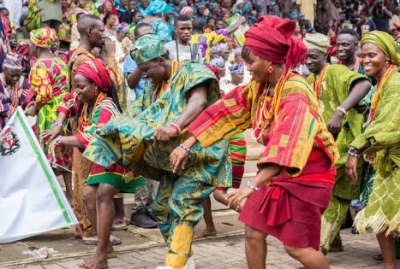Communications And EntertainmentNews And PoliticsMotivationalsStories And PoemsRelationship And MarriageBusiness And MoneyScience And TechnologyArts And EducationHealth And LifestyleSports And FitnessFamily And HolidaysPersonal Care And BeautyFood And KitchenEngineeringIT And Computer ScienceHobbies And HandiworksQuestions And AnswersReligion And PrinciplesSocial SciencesUSMLE And MedicalsVehicles And MobilityAnimals
profile/34020210927-161016.png
Ogbonnaya99

Nigeria Cultures
~8.3 mins read
Nigeria, the most populous African country (with a population of over 200 million in 2018),[3] is divided between adherents of Christianity, Islam and traditional religion quite similar to polytheism though the exact ratio is uncertain. The majority of Nigerian Muslims are either non-denominational Muslims or Sunni and are concentrated in mostly the northern region of the country with some Christian population, the same way Christians dominate in the south with some Muslim population. Most Nigerian Christians are Protestant (broadly defined) though about a quarter are Catholic.[4]
Nigeria has the largest Muslim population in sub-Saharan Africa.[5] Islam dominates the north and has a number of supporters in the southwestern, Yoruba part of the country. In terms of Nigeria's major ethnic groups' religious affiliations, the Hausa ethnic group in the north is mostly Muslim, the Yoruba tribe in the west is divided among mainly Muslim, Christian and traditional religions, while the Igbos of the east and the Ijaw in the south are predominantly Christians (Catholics) and some practitioners of traditional religions.[6]The middle belt of Nigeria contains the most of the minority ethnic groups in Nigeria and they are mostly Christians and members of traditional religions with few Muslim converts.[7][8]
The two largest affiliations among Muslims in Nigeria are non-denominational Muslims and Sunni, belonging to Maliki school of jurisprudence; however, a sizeable minority also belongs to Shafi madhhab.[citation needed]Many Sunni Muslims are members of Sufibrotherhoods. Most Sufis follow the Qadiriyya, Tijaniyyah or Mouride movement.[citation needed]A significant Shia minority exists (see Shia in Nigeria). Some northern states have incorporated Sharia law into their previously secular legal systems, which has brought about some controversy.[9] Kano State has sought to incorporate Sharia law into its constitution.[10] The majority of Quranistsfollow the Kalo Kato or Quraniyyun movement.[citation needed] There are also Ahmadiyya and Mahdiyya minorities.[11]
Survey data
Abrahamic religions
Traditional beliefs
Inter-religious conflict
Atheism
Other religions
By state
See also
References
Advertisement

Link socials
Matches
Loading...


